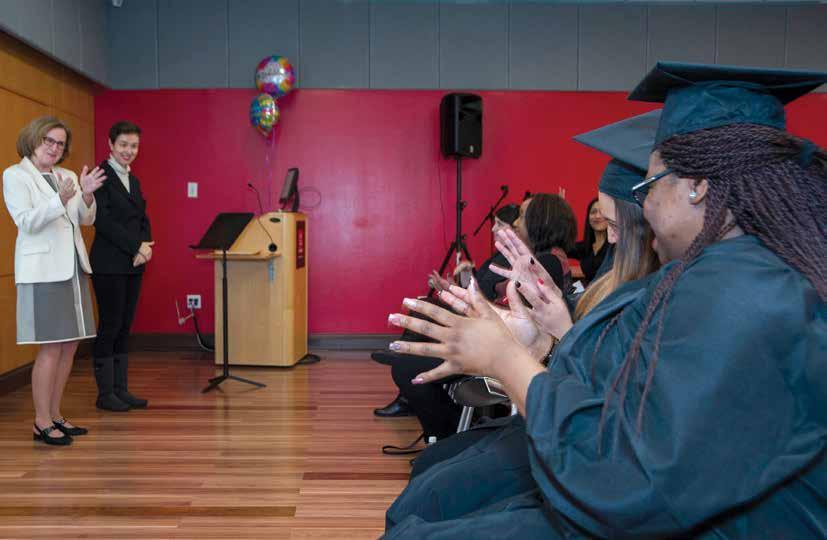
4 minute read
Deaf Culture Today
Dr. Gail Mellow, President of LaGuardia Community College (far left) applauds students at graduation as NEDP graduates Pamela Manzueta and Channel Arthur (far right) cheer on.
Advertisement
INTERVIEW BY NAD INTERN SHIRLEY SHANNON
There are many National External Diploma Program sites over the U.S., but there is only one that serves the deaf and hard-of-hearing community. The interview below is with Pacts Cartagna and Sasha L. Ponappa who work at the Program for Deaf Adults (PDA) at LaGuardia Community College (”LaGuardia”), which is part of the City University of New York (CUNY).
PDA at LaGuardia is one of the country’s largest programs for deaf and deaf-related postsecondary educational and support services. The program offers Adult Basic Education (ABE) and High School Equivalency (HSE) classes. PDA assists Associate degree students with improving their language and academic skills and with obtaining support services, such as: academic advisement, interpreting services, captioning, tutoring, and other accommodations. PDA also accepts students who want to begin a career as an ASL-English interpreter into its ASL-English Interpretation Program (AEIP).
Tell us about the most recent pilot program at LaGuardia, the National External Diploma Program (NEDP). Many deaf and hard-of-hearing adults struggle with high school equivalency exams, so PDA established a pilot program of the National External Diploma Program (NEDP), a high school equivalency program in which students are given multiple chances to complete a portfolio to receive their degree instead of taking a high school equivalency exam. According to www.casas.org/nedp/locations, there are 84 NEDP sites in eight states; the NEDP program at PDA is the only one nationally to serve deaf and hard-of-hearing clients. Through a performance-based approach such as the NEDP, qualified deaf and hard-of-hearing students can show they are college-ready and career-ready. For too many years, deaf and hard-of-hearing students have been denied this opportunity due to reliance on highstakes tests which have served as gatekeepers for this particular population of students. More importantly, the program essentially requires students to create a portfolio of work which is now considered cutting edge in assessment. Today, people are realizing that high-stakes testing isn’t the way to go. When students qualify for the Generalized Assessment Phase of the NEDP, i.e. once they have passed all the necessary diagnostic exams, barring any life crises and with sustained motivation, they WILL receive their high school equivalency diploma.
Tell us about those who participate and their experience after they complete the program? We started with two NEDP clients, both of whom received their New York State High School Equivalency (HSE) diploma in one year through the NEDP program. One of those two individuals is now enrolled in degree studies at LaGuardia Community College. We have observed that if NEDP clients are motivated enough and willing to commit to the program, they will receive their diploma. The NEDP is a feasible alternative to HSE exams.
NEDP graduates Pamela Manzueta and Channel Arthur proudly display their diplomas.

Tell us more about various aspects of NEDP and why this is important? The NEDP is structured so that all information needed to perform tasks is contained within the platform that is used. This means, for example, all reading resources and step-by-step procedures to create budgets or graphs, or to upload files, are part of the NEDP system. Most importantly, these resources are all written at a comfortable reading level and are therefore highly accessible for clients. We know that many deaf and hard-of-hearing adults are looking for accessible G.E.D./HSE programs so that they can earn higher wages or go to college.
Why do you think deaf and hard-of-hearing adults have lower rate of high school and college graduation, and relatedly, higher rates of unemployment and lower family incomes? From our observation and through experience, we find that deaf and hard-of-hearing youth are often given inappropriate reading and writing curricula, are assigned to teachers who are poorly-skilled as communicators, and are given inappropriate exams in their formative years. There has been a drastic shift in education to focus on the creation and administration of high-stakes standardized testing,
We have observed that if National External Diploma Program clients are motivated enough and willing to commit to the program, they will receive their diploma.
and not enough focus on the intelligence and skills of the whole student. With that shift, there is less attention on how to teach literacy or be language models for disenfranchised, deaf and hard-ofhearing students who do not have strong exposure to language foundation in English and/or ASL. There needs to be more study on why such staggering rates exist.
What are some creative accommodations that participants can utilize while in the NEDP? We offer deaf and hard-of-hearing clients extended time for work on NEDP tasks and program support is provided in ASL and via videoconferencing. Virtualizing parts of the NEDP will allow us to serve a larger pool of deaf and hard-of-hearing people outside of New York City. Since the NEDP is an Internet-based platform, it allows these students to work on their own time, maintain jobs and care for their families.
If someone would like to know more information about NEDP and LaGuardia Community College, what do you recommend? People can contact Pacts Cartagna, the Coordinator of Continuing Education Programs, Program for Deaf Adults at LaGuardia Community College; pcarlson@lagcc.cuny.edu; 917-832-1202 VP/voice; 347-815-0179 SMS and Dr. Sue Livingston, Professor for Program for Deaf Adults and in LaGuardia’s Department of Education and Language Acquisition; slivings@lagcc.cuny.edu.
Shirley Shannon was an intern with the NAD during the summer of 2017.










